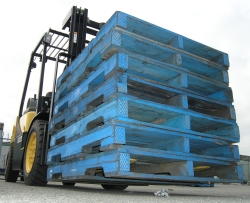As any coach in the sporting world will tell you, whether it’s your swing, throw, stroke, or shot; the follow through is every bit as important as the wind-up. In the same vein, any industrial mobile equipment trainer that’s worth their salt will tell you, the job isn’t done until operators have demonstrated competence on the type(s) of equipment they are actually assigned to operate. That is a trainer’s follow through.
 I have noticed a rather frightening trend unfolding out there in which seemingly reputable training providers are doing general training and evaluation but implying that it is specific training. In some cases, these training programs are being delivered off site which right there is a red flag since training must be equipment and site-specific and evaluation must be conducted in the workplace as per federal and state operator training regulations.
I have noticed a rather frightening trend unfolding out there in which seemingly reputable training providers are doing general training and evaluation but implying that it is specific training. In some cases, these training programs are being delivered off site which right there is a red flag since training must be equipment and site-specific and evaluation must be conducted in the workplace as per federal and state operator training regulations.
On the surface nothing appears to be lacking from an employer’s perspective as they are being told that their operators are getting trained and evaluated as they should and that they’re covered, but what is actually happening in many cases is:
- The initial basic training is too general, in that the number of topics addressed are abbreviated and are not covered to an adequate degree of detail nor is it specific to any particular type of forklift.
- The practical evaluation is conducted using equipment that may or may not be used by the trainee at his or her work-site. Given the amount of variation in the operational design of many forklifts, and that fact that evaluation in the workplace is mandated by regulation (in the US), this can present a high hazard potential not to mention liability for employers.
- The site-equipment-specific training is left to the employer and/or user to deliver after the training provider completes the general training and evaluation. This is just wrong on a number of levels and, in the end, these facts are not conveyed to the employer by the training provider.
- Employers often do not look past the fact that an operator returns to the work-site with a ticket or certificate of some kind which in their minds qualifies the holder to operate anything, regardless of what it was they were evaluated on. This usually means that the specific training never takes place.
- If model specific training and/ or evaluation actually does take place with the returning operator, it is often hastily delivered by unqualified personnel that have no idea of what the operator was trained on or how he/she was told to operate the equipment
I suppose that some training providers are doing things this way because they feel it may bag them more business by appearing to offer quick and cheap route to qualifying operators, which are always big selling points with busy contractors and employers; but is it really quicker or cheaper? If I am a contractor and I choose to get a bunch of people trained up on a forklift, here’s the way it would play out…
I would round up all of my people that could possibly be directed to operate the unit, or as many of them as I could spare and send them off site for training. They would likely be gone for at least 6-hours, so for all intents and purposes, a full day. When they return the next day, I need to “familiarize” them with the machine(s) they will actually be asked to operate on site. I will also need to bring them up to speed on the local hazards and any site specific rules and company polices related to their job(s).
Now I need to have them evaluated operating the machine they are assigned to, because I want it on record that they have demonstrated competence to a qualified person in the workplace, as per mandatory regulatory requirements – whether the person to whom the operator demonstrates competence to is qualified to evaluate the demonstration is another issue I need to deal with. All of this training and evaluation after the original program delivered by the training provider is time and money out of my pocket and by now I’m feeling pretty frustrated.
Employers could save themselves a lot of time, money and potential grief by making sure they provide site and equipment-specific training regardless of who they choose to deliver it and that performance evaluations are conducted in the workplace using the same type of equipment the operators are actually assigned to operate.
This has been the way it is in the US for the past 15 years now and no federal or state regulatory authority is going to have any compassion for employers that don’t know this. In addition, it’s just the right thing to do to make sure everyone goes home at the end of the day.
Rob Vetter
Director of Training
IVES Training Group
Did you enjoy this article? Sign up for our newsletter to receive more like this!